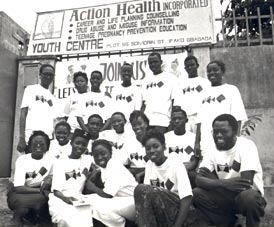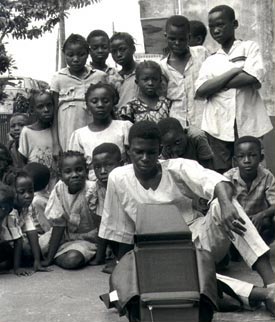NIGERIA—Action Health
 … I met a young man with a sports car who accosted me. He so much admired me that he came looking for me at the [Action Health] office. I did a lot of showing off to him, working harder than ever with audio dubbing which looked like magic to him. I got him confused and he started asking me questions about myself, my work and my office... By the end he looked at me and shook his head and said, "Are you not too small or rather very young to know all these things?" Anyway he excused himself with a look of respect on his face.
… I met a young man with a sports car who accosted me. He so much admired me that he came looking for me at the [Action Health] office. I did a lot of showing off to him, working harder than ever with audio dubbing which looked like magic to him. I got him confused and he started asking me questions about myself, my work and my office... By the end he looked at me and shook his head and said, "Are you not too small or rather very young to know all these things?" Anyway he excused himself with a look of respect on his face.
Ijeoma Okereke, 17 years old
Action Health Video Coordinator
Partner Organization Profile
Action Health Incorporated (AHI) is a non-governmental organization (NGO) in Lagos committed to giving Nigerian youth reproductive health information and life planning skills. A central part of Action Health's work is training adolescents as health educators who can communicate effectively with their peers both at Action Health's center and in public schools, largely through school-based "Health and Life Planning Clubs." Action Health also distributes a teen-produced newsletter, Growing Up.
Project Implementation
The Action Health Participatory Video Workshop in 1992 was attended by ten peer educators, four staff and three founding members. A representative of the Nigerian Youth AIDS Program (NYAP) in Calabar was also invited to attend the workshop. NYAP seeks to reach young women and students who are at great risk for AIDS, and has access to a camcorder.
The gender mix among the participating Action Health peer educators was equal. Most were the top students in their class and in their final year at school. Though the workshop participants had no previous experience producing video, they were avid viewers of popular Nigerian television programs and highly polished music videos such as King Sunny Ade's "Choices," which addresses family planning.
 The teen participants quickly became adept in operating the Hi-8 equipment. During the 15-day workshop, they gained further skills in production planning and storyboarding, researching, interviewing, and working as part of a team while shooting. By the end of the training, each participant had produced his or her own program. Although several emulated the style of popular TV talk show hosts, they tackled issues unlikely to be addressed in the mainstream media. The importance of parent-teen communication on issues of sexuality was by far the most popular topic, followed closely by the need for reproductive health education in schools. The priority given by teen participants to these issues reflected the absence of opportunities for young people to gain information on matters critically affecting their health. Other topics included teen pregnancy, STDs and HIV/AIDS, and sexual harassment.
The teen participants quickly became adept in operating the Hi-8 equipment. During the 15-day workshop, they gained further skills in production planning and storyboarding, researching, interviewing, and working as part of a team while shooting. By the end of the training, each participant had produced his or her own program. Although several emulated the style of popular TV talk show hosts, they tackled issues unlikely to be addressed in the mainstream media. The importance of parent-teen communication on issues of sexuality was by far the most popular topic, followed closely by the need for reproductive health education in schools. The priority given by teen participants to these issues reflected the absence of opportunities for young people to gain information on matters critically affecting their health. Other topics included teen pregnancy, STDs and HIV/AIDS, and sexual harassment.
Participants learned that producing a program is only the first step in participatory video. Equally important is facilitating discussion about the issues raised in the tape and challenging their peers to think in new ways about their bodies, health and sexuality issues. By the end of the workshop they had become adept at critiquing programs and could clearly express why they would or would not show a particular program in the Health and Life Planning Club at their school, or to other parents and teachers.
In order to ensure the continuity of the video program, it was decided that each trained peer educator/video producer would in turn train a younger student in production and playback skills. The students trained through this apprentice-type arrangement were dubbed "video babies" and subsequently received peer educator training as well.
The Action Health video team has produced programs on sex education, parent-child communication, AIDS and STD awareness, puberty, drug use, smoking, rape, and the role of health counselors. Some are dramas, others mini-documentaries; they include on-the-street interviews, songs, dances, in-depth conversations and panel discussions. The element they all share is the creative force of young people addressing other young people about concerns they have in common. When students from another school district visited Action Health and screened some programs, they were impressed that these videos were "of the teens, by the teens, and for the teens."
Action Health's videos are shown at the organization's drop-in center as well as in public schools. Peer educators have reported occasions on which over 200 students fill the room and spill into the hallway at their Health and Life Planning Club meetings when a video is being screened. Young people sometimes make their first visit to the Action Health center requesting to see a particular video. Indeed, Action Health's director, Nike Esiet, attributes a dramatic increase in drop-in center attendance to word of mouth about their video programs.
 Over time, video has been integrated into Action Health's program and recognized as a valued element of its success. Video has advanced the organization's health training programs. The coordinators find that video is a catalyst for communication; it encourages students to express themselves and become more actively involved.
Over time, video has been integrated into Action Health's program and recognized as a valued element of its success. Video has advanced the organization's health training programs. The coordinators find that video is a catalyst for communication; it encourages students to express themselves and become more actively involved.
Further, video activities have helped to build leadership skills among the teens involved with the program. By taking responsibility, mastering technical skills, showing their work to their peers, facilitating discussions, and training others, video team members gain confidence. Action Health's video unit is currently headed by two recent high school graduates, a young man and woman. Their leadership, as well as the gender-mixed video team, offer positive examples of equal participation and collaboration. [Read more about video by teens, for teens]
"...the video programme has engendered in us teens on the team a lot of confidence, solidarity and greater ability to communicate effectively with others our needs as teenagers."
Emmanuel Ehinmero and Ijeoma Okereke,
Action Health video coordinators
Celebrating Communication
"The Action Health participatory video competition in 1993 was an exciting and motivating event for peer educators/producers and "video babies" alike. Video staff and student coordinators developed a detailed set of evaluation criteria. They designated teen representatives from various schools to screen and assess the tapes, taking care to insure non-biased evaluation. Prizes were then awarded based on content and technical quality of the productions, and to the most active video team member. In addition, a prize was given to the most active resource teenager, in order to encourage teens who are not video team members to participate in the productions and playbacks. The competition culminated in a video festival. 250 students, teachers, principals and parents screened the winning tapes and attended the prize-giving ceremony."
account published in Growing Up,
Action Health’s teen-produced newsletter
In a follow-up C4C training workshop in 1994, Action Health gained editing equipment and post-production skills. The video team has continued its production and playback activities throughout the many changes in Nigeria's turbulent political climate.
The Action Health participatory video project was funded by the John D. and Catherine T. MacArthur Foundation.
© Communication for Change, Inc. 2003-2019. All rights reserved.
